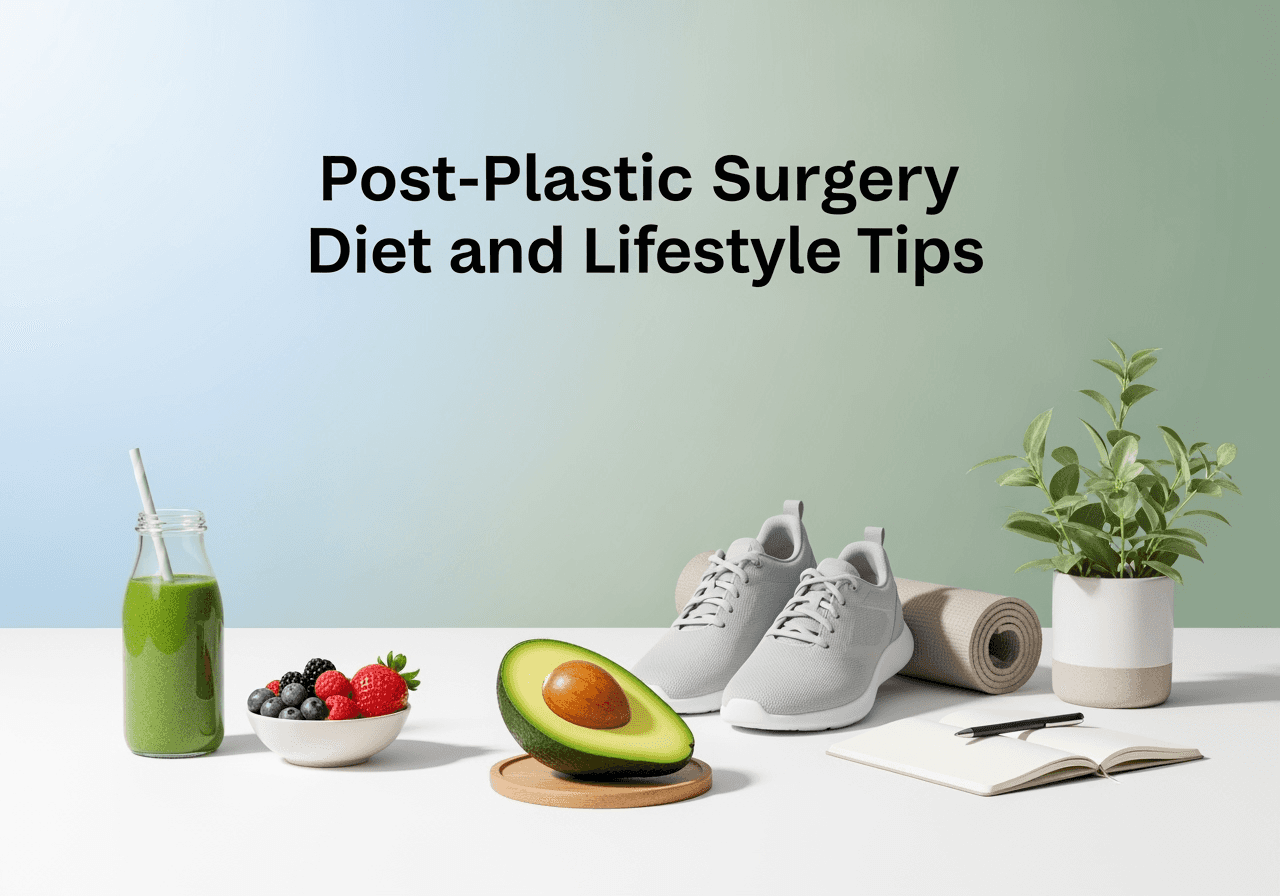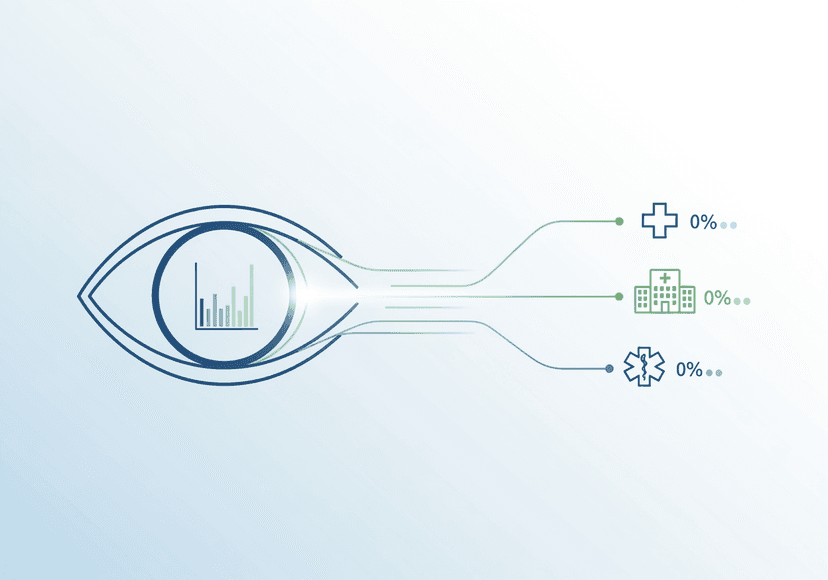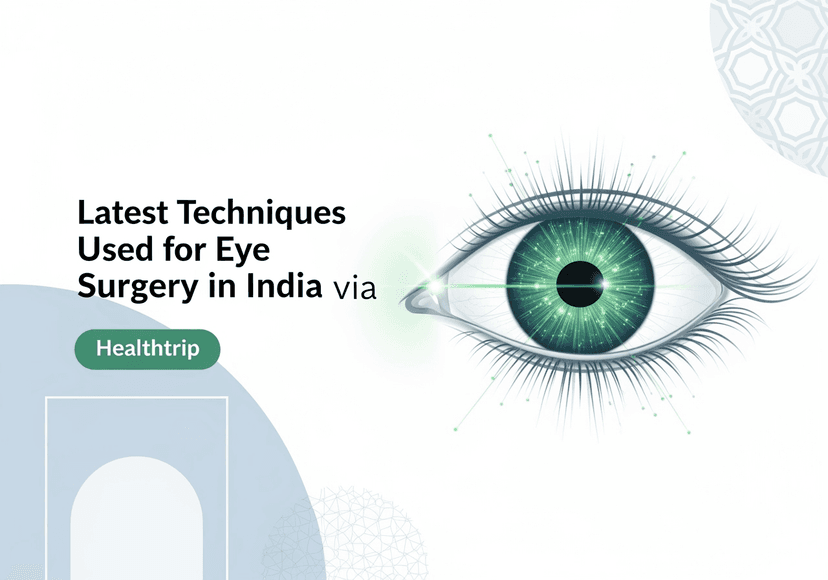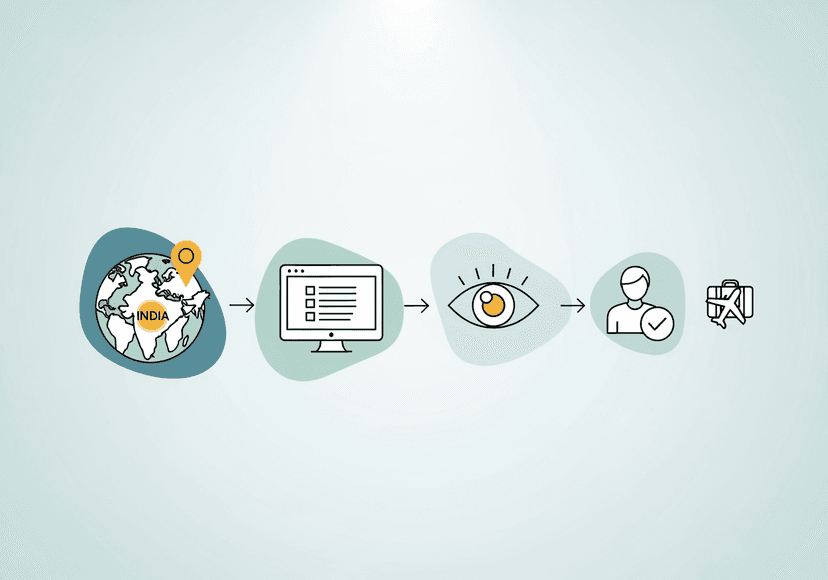
Post-Plastic Surgery Diet and Lifestyle Tips
15 Oct, 2025
 Healthtrip
Healthtrip- Where to Recover After Plastic Surgery < li>Why is a Proper Diet Crucial After Plastic Surgery? < li>Who Benefits from Post-Plastic Surgery Dietary Guidelines?
- How to Plan Your Post-Surgery Meals: A Step-by-Step Guide
- Foods to Eat and Avoid After Plastic Surgery
- Essential Lifestyle Tips for a Smooth Recovery < li>Recommended Hospitals for Plastic Surgery and Recovery
- Conclusion: Your Path to a Successful Recovery
Dietary Guidelines for Post-Surgery Recovery
Nutrition plays a pivotal role in the healing process after plastic surgery. Your body needs the right building blocks to repair tissues and reduce inflammation. Focus on a diet rich in protein, which is essential for tissue regeneration. Lean meats, poultry, fish, beans, and tofu are excellent sources. Don't shy away from healthy fats either! Avocados, nuts, seeds, and olive oil can help reduce inflammation and support cell growth. Incorporate plenty of fruits and vegetables, especially those high in Vitamin C, like oranges, strawberries, and bell peppers, which boost collagen production and wound healing. Hydration is also key, so aim to drink at least eight glasses of water a day to keep your skin supple and aid in detoxification. Avoid processed foods, sugary drinks, and excessive salt, as these can hinder healing and increase swelling. Remember, a well-nourished body recovers faster and more efficiently. Many of our partner hospitals, such as Memorial Sisli Hospital in Istanbul, offer specialized dietary consultations to tailor a meal plan to your specific needs post-surgery. We at Healthtrip can help you connect with the right medical professionals to optimize your recovery process.
Most popular procedures in India
Foods to Embrace and Those to Avoid
Embrace foods that promote healing and minimize inflammation. Brightly colored fruits and vegetables like berries, spinach, and carrots are packed with antioxidants that fight free radicals and support tissue repair. Salmon and other fatty fish are rich in omega-3 fatty acids, which have anti-inflammatory properties. Probiotic-rich foods like yogurt and kefir can help maintain a healthy gut microbiome, boosting your immune system. On the other hand, it’s best to avoid processed foods, sugary snacks, and excessive caffeine. These can not only hinder the healing process but also increase inflammation and potentially lead to complications. High-sodium foods can cause fluid retention, contributing to swelling, so be mindful of your salt intake. Alcohol and smoking should be strictly avoided as they can significantly impede recovery and increase the risk of infection. If you are undergoing treatment at Yanhee International Hospital, it will be emphasized these same critical dietary measures. A careful selection of foods can make a world of difference in your recovery journey. Healthtrip is committed to connecting you with resources and information to make informed dietary choices.
Wellness Treatments
Give yourself the time to relax
Lowest Prices Guaranteed!

Lowest Prices Guaranteed!
Lifestyle Adjustments for Optimal Healing
Beyond diet, certain lifestyle adjustments can significantly impact your recovery. Getting adequate rest is paramount. Aim for at least 7-8 hours of quality sleep each night, as this is when your body does the majority of its repair work. Gentle exercise, such as walking, can improve circulation and reduce the risk of blood clots, but always consult with your surgeon, perhaps one from Fortis Hospital, Noida, before starting any exercise regimen. Avoid strenuous activities that could put stress on the surgical site. Stress management is equally important, as stress can hinder healing. Practice relaxation techniques such as deep breathing, meditation, or gentle yoga. Create a calm and supportive environment to promote emotional well-being. Follow your surgeon's instructions meticulously regarding wound care, medication, and follow-up appointments. Remember, patience is key during the recovery process. It's a journey that requires time and self-compassion. Healthtrip is dedicated to providing resources and support to help you navigate these lifestyle adjustments and ensure a smooth and successful recovery.
The Importance of Rest and Gradual Activity
Rest isn't just about sleeping; it's about giving your body the time and space it needs to heal without added stress. Avoid overexerting yourself in the weeks following surgery. Listen to your body and take breaks when needed. As you begin to feel stronger, gradually introduce light activities like short walks. These can help improve circulation and prevent stiffness, which is essential for optimal healing. If you experience increased pain or swelling after any activity, reduce the intensity or duration. It's crucial to find the right balance between rest and activity to support your recovery without causing setbacks. Remember that complete recovery might take several weeks or even months, depending on the extent of your procedure. Places like NMC Specialty Hospital, Al Nahda, Dubai offer amazing serene options for post surgery rest and relaxation. Healthtrip is dedicated to providing resources and support to help you find this balance and ensure a swift and successful recovery
Where to Recover After Plastic Surgery
Choosing the right place to recover after plastic surgery is just as crucial as selecting the right surgeon. It's about setting yourself up for success, comfort, and a speedy recovery. Imagine returning home to a chaotic environment filled with daily stresses and chores – it’s hardly the ideal scenario for healing! Instead, consider a serene environment designed to cater to your post-operative needs. This could range from the comforting familiarity of your own home, meticulously prepared for your return, to a specialized recovery center, or even a luxurious hotel. The goal is to minimize stress, ensure easy access to medical care if needed, and allow you to focus solely on your well-being. Healthtrip understands that finding the perfect recovery spot is essential, which is why we partner with hospitals like Saudi German Hospital Cairo, Egypt, and Yanhee International Hospital, offering recovery facilities that prioritize your comfort and medical needs. These facilities provide a tranquil environment, skilled nursing care, and amenities designed to promote healing. Think of it as a nurturing cocoon where you can rest, rejuvenate, and embark on your journey to a new you.
Home Sweet (Prepared) Home
The comfort of recovering in your own home is undeniable. There's a sense of security and familiarity that can be incredibly soothing during the healing process. However, transforming your home into a post-surgery sanctuary requires careful planning. Before your procedure, enlist the help of family or friends to prepare your living space. This might involve setting up a comfortable recovery area with easy access to essentials like medications, water, and entertainment. Consider rearranging furniture to create wider pathways and minimize the risk of tripping. Stock up on soft, comfortable clothing and linens that won't irritate sensitive skin. Most importantly, ensure you have assistance with daily tasks such as cooking, cleaning, and laundry. Remember, the goal is to eliminate any physical strain and allow your body to focus on healing. While home provides emotional comfort, it's crucial to acknowledge its limitations. Professional post-operative care might not be readily available, and managing complications could become challenging. Therefore, a well-prepared home environment, coupled with a strong support system, is key to a successful recovery.
The Allure of Recovery Centers
For those seeking a more structured and medically supervised recovery, specialized recovery centers offer a compelling alternative. These centers are designed specifically for post-operative care, providing a dedicated team of nurses, therapists, and support staff. Imagine the peace of mind knowing that medical professionals are available around the clock to monitor your progress, manage pain, and address any concerns that may arise. Recovery centers typically offer a range of services, including wound care, medication management, lymphatic drainage massage, and physical therapy. They also provide a tranquil and supportive environment, free from the distractions and responsibilities of everyday life. This allows you to focus entirely on your healing process, without worrying about household chores or other obligations. While recovery centers offer numerous benefits, it's essential to consider the cost and potential limitations on personal freedom. However, for individuals seeking comprehensive medical care and a stress-free recovery experience, a recovery center can be an invaluable investment. Healthtrip can assist you in finding reputable recovery centers near hospitals like Vejthani Hospital and Mount Elizabeth Hospital, ensuring you receive the highest standard of care.
Hotel Healing: A Touch of Luxury
For a blend of comfort and convenience, some patients opt to recover in a hotel setting. This can be particularly appealing for those traveling for surgery or seeking a more luxurious recovery experience. Many hotels near reputable hospitals offer specialized post-operative packages, including amenities such as in-room medical equipment, nursing care, and meal delivery services. The advantage of a hotel recovery is the combination of privacy, comfort, and access to hotel amenities like room service, spa treatments (when appropriate), and concierge services. However, it's crucial to choose a hotel that is experienced in catering to post-operative patients and has established relationships with nearby medical facilities. Ensure that the hotel staff is trained to handle medical emergencies and can provide prompt assistance if needed. While a hotel offers a more upscale environment, it's important to remember that it's not a substitute for professional medical care. Therefore, it's essential to have a plan in place for follow-up appointments and access to medical support. Healthtrip can help you find hotels that partner with hospitals like Fortis Memorial Research Institute and LIV Hospital, Istanbul to provide seamless post-operative care, ensuring a comfortable and worry-free recovery.
Why is a Proper Diet Crucial After Plastic Surgery?
Think of your body as a construction site, and plastic surgery is a major renovation project. Just as a building needs the right materials to withstand the test of time, your body needs the right nutrients to heal and rebuild after surgery. A proper diet isn't just about shedding extra pounds (though that can be a bonus!) , it's about providing your body with the essential building blocks it needs to repair tissues, reduce inflammation, and fight off infection. Imagine trying to build a house with flimsy materials – it simply wouldn't stand strong. Similarly, a diet lacking in essential nutrients can hinder your recovery, leading to complications, prolonged healing times, and less-than-optimal results. Healthtrip understands that nutrition plays a pivotal role in post-operative healing, which is why we emphasize the importance of a well-balanced diet tailored to your specific needs. We encourage you to consult with a nutritionist or registered dietitian who can create a personalized meal plan to support your recovery journey. This isn't just about following a generic diet; it's about fueling your body with the precise nutrients it needs to thrive and achieve the best possible outcome from your surgery.
Fueling the Healing Process
After plastic surgery, your body enters a heightened state of repair, requiring a significant increase in energy and nutrient intake. Protein, in particular, becomes a superstar nutrient, playing a vital role in tissue regeneration and wound healing. Think of protein as the bricks and mortar of your body, essential for rebuilding damaged tissues and creating new cells. Adequate protein intake helps to accelerate wound closure, reduce scarring, and strengthen the immune system. Similarly, vitamins and minerals act as the construction crew, orchestrating various biochemical processes that contribute to healing. Vitamin C, for example, is crucial for collagen synthesis, which is essential for skin repair and elasticity. Zinc plays a vital role in immune function and wound healing. A deficiency in these essential nutrients can significantly impede the recovery process. Therefore, it's crucial to prioritize nutrient-dense foods that provide your body with the fuel it needs to heal efficiently. Choosing lean protein sources like chicken, fish, and beans, along with colorful fruits and vegetables, ensures that your body receives the optimal blend of nutrients to support its healing efforts.
Combating Inflammation and Infection
Inflammation is a natural response to surgery, but excessive inflammation can hinder the healing process and contribute to discomfort. Certain foods can exacerbate inflammation, while others can help to reduce it. Processed foods, sugary drinks, and unhealthy fats tend to promote inflammation, while fruits, vegetables, and omega-3 fatty acids possess anti-inflammatory properties. Incorporating foods rich in antioxidants, such as berries, leafy greens, and green tea, can help to neutralize free radicals and reduce oxidative stress, further mitigating inflammation. Furthermore, maintaining a healthy gut microbiome is essential for immune function and reducing the risk of infection. Probiotic-rich foods like yogurt, kefir, and sauerkraut can help to promote the growth of beneficial bacteria in the gut, strengthening the immune system and preventing infections. Avoiding sugary foods and excessive alcohol consumption is also crucial, as these can weaken the immune system and increase susceptibility to infection. By making informed food choices, you can actively combat inflammation, strengthen your immune system, and create an environment conducive to healing.
Optimizing Results and Minimizing Complications
A proper diet isn't just about speeding up recovery; it's also about optimizing the aesthetic results of your surgery and minimizing the risk of complications. For example, adequate hydration is crucial for maintaining skin elasticity and preventing dehydration, which can affect the overall appearance of your results. Consuming a balanced diet rich in vitamins and minerals can also help to minimize scarring and promote healthy skin regeneration. Furthermore, a healthy diet can help to prevent common post-operative complications such as constipation, nausea, and swelling. Fiber-rich foods like fruits, vegetables, and whole grains can help to regulate bowel movements and prevent constipation. Ginger and peppermint tea can help to alleviate nausea. Limiting sodium intake and staying hydrated can help to reduce swelling. By adhering to a well-planned post-operative diet, you can not only accelerate your recovery but also enhance the aesthetic outcome of your surgery and minimize the risk of unwanted complications. Healthtrip recommends consulting with medical professionals at hospitals like Bangkok Hospital or Max Healthcare Saket to get tailored dietary guidance.
Who Benefits from Post-Plastic Surgery Dietary Guidelines?
Let's be honest, anyone undergoing plastic surgery is making a significant investment in their well-being and appearance. You're entrusting your body to a skilled surgeon, but the journey doesn't end when you leave the operating room. It's what you do *after* surgery that truly determines the success of your results and the speed of your recovery. This guide isn't just for a specific demographic; it's for anyone who wants to maximize the benefits of their procedure, minimize potential complications, and achieve a smooth, comfortable healing process. Whether you're a busy professional, a stay-at-home parent, or a retiree embarking on a new chapter, these dietary guidelines can empower you to take control of your recovery and achieve the best possible outcome. Think of it as a roadmap to optimal healing, guiding you towards the right choices that will nourish your body and support its natural regenerative abilities. Healthtrip believes that everyone deserves access to the information they need to make informed decisions about their health, which is why we've created this comprehensive guide to post-plastic surgery nutrition.
Anyone Undergoing Elective Cosmetic Procedures
If you're considering or have already scheduled an elective cosmetic procedure, such as a facelift, breast augmentation, liposuction, or tummy tuck, these dietary guidelines are specifically tailored for you. Elective procedures are performed to enhance appearance and boost self-confidence, and a proper post-operative diet can significantly amplify these benefits. By following these guidelines, you can ensure that your body receives the necessary nutrients to heal efficiently, minimize scarring, and optimize the aesthetic outcome of your surgery. Imagine investing in a beautiful piece of art and then neglecting its care – it simply wouldn't retain its beauty for long. Similarly, neglecting your diet after plastic surgery can compromise your results and prolong your recovery. These guidelines provide you with the knowledge and tools to nourish your body from the inside out, supporting its natural healing processes and maximizing the rewards of your cosmetic investment. Places like Real Clinic and London Medical offer comprehensive pre and post surgery guidance.
Individuals Seeking Reconstructive Surgery
Reconstructive surgery aims to restore function and appearance after injury, illness, or congenital defects. These procedures often involve more extensive tissue manipulation and require a robust healing response. Whether you've undergone breast reconstruction after mastectomy, facial reconstruction after trauma, or any other type of reconstructive surgery, these dietary guidelines can play a crucial role in your recovery. A well-planned diet can provide your body with the building blocks it needs to regenerate damaged tissues, fight off infection, and minimize scarring. Furthermore, it can help to improve your overall health and well-being, which is particularly important during a challenging recovery period. Think of your body as a resilient garden that needs nurturing to flourish after a storm. A proper diet acts as the fertilizer, water, and sunlight, providing your body with the essential elements it needs to rebuild and thrive. Healthtrip understands the unique challenges faced by individuals undergoing reconstructive surgery, and we are committed to providing you with the resources and support you need to achieve a successful recovery. Consider hospitals such as Quironsalud Hospital Murcia or Hisar Intercontinental Hospital that offer post-reconstructive procedure support.
Patients with Underlying Health Conditions
If you have underlying health conditions such as diabetes, heart disease, or autoimmune disorders, following these dietary guidelines is even more critical. These conditions can affect your body's ability to heal and increase the risk of complications after surgery. A carefully tailored diet can help to manage your underlying health condition, support your immune system, and promote optimal healing. For example, individuals with diabetes need to carefully monitor their blood sugar levels after surgery, and a low-glycemic diet can help to prevent blood sugar spikes. Individuals with heart disease may need to limit their sodium intake and consume heart-healthy fats. Individuals with autoimmune disorders may benefit from an anti-inflammatory diet. It's essential to work closely with your surgeon and a registered dietitian to develop a personalized meal plan that addresses your specific needs and health conditions. Think of your body as a delicate ecosystem that requires careful balance. These dietary guidelines can help you to maintain that balance, minimizing the risk of complications and promoting a smoother recovery. Healthtrip encourages you to seek guidance from reputable hospitals like NMC Specialty Hospital, Al Nahda, Dubai, which offer specialized care for patients with underlying health conditions.
Also Read:
How to Plan Your Post-Surgery Meals: A Step-by-Step Guide
Planning your meals after plastic surgery is like setting the stage for a successful performance – it requires preparation, attention to detail, and a clear understanding of the desired outcome. Think of your body as a garden that needs nurturing. Post-surgery, this garden is undergoing a period of intense healing, demanding specific nutrients to flourish. Therefore, meal planning becomes less about satisfying cravings and more about fueling recovery. Start by consulting with your surgeon or a registered dietitian. They can provide personalized advice based on the procedure you underwent and your individual health needs. This is crucial because what works for one person might not work for another. Next, make a list of foods rich in protein, vitamins, minerals, and healthy fats. Think lean meats, poultry, fish, eggs, dairy products, beans, legumes, colorful fruits, and vibrant vegetables. Don't forget healthy fats like avocados, nuts, seeds, and olive oil. Once you have your list, create a weekly meal plan that incorporates these foods in a variety of ways. It's also handy to prepare some meals in advance and freeze them. This way, on days when you're feeling fatigued or overwhelmed, you'll have nutritious options readily available. Remember, consistency is key. Stick to your meal plan as closely as possible for the best results. And don't hesitate to make adjustments along the way based on how your body is responding.
Step 1: Consult with Professionals
Before diving into meal prep, it is essential to consult with your surgeon or a registered dietitian. These experts offer invaluable guidance tailored to your specific surgical procedure and individual health needs. They will consider factors such as the type of surgery you had, your current health condition, and any pre-existing dietary restrictions. This consultation ensures that your meal plan is not only safe but also optimized for the healing process. The professional will also guide you on the quantity of water intake that’s crucial to keep you hydrated. They can recommend foods rich in nutrients that aid in wound healing, reduce inflammation, and boost your immune system. Think of this step as building a solid foundation for your recovery strategy. Without this tailored advice, you might inadvertently consume foods that hinder your progress or cause complications. It is also a good opportunity to address any concerns or misconceptions you might have about post-surgical nutrition. Getting professional advice is the best way to ensure that you are on the right track and have the support you need to navigate your recovery journey with confidence.
Step 2: Create a Nutrient-Rich Shopping List
Once you have a clear understanding of your dietary needs, it's time to create a nutrient-rich shopping list. This list should include foods that are packed with the essential nutrients your body needs to heal and recover. Prioritize protein-rich options such as lean meats, poultry, fish, eggs, and beans. Protein is the building block of tissues and plays a crucial role in wound repair. Next, focus on fruits and vegetables that are bursting with vitamins and minerals. Choose a rainbow of colors to ensure you are getting a wide range of nutrients. Think berries, leafy greens, citrus fruits, and colorful bell peppers. These foods are rich in antioxidants, which help reduce inflammation and boost your immune system. Don't forget about healthy fats, as they are essential for cell growth and hormone production. Include sources like avocados, nuts, seeds, and olive oil in your shopping list. Finally, add whole grains like brown rice, quinoa, and oats for a steady source of energy. Avoid processed foods, sugary drinks, and excessive amounts of unhealthy fats. By creating a nutrient-rich shopping list, you are setting yourself up for success and ensuring that you have the right ingredients on hand to fuel your recovery.
Step 3: Prepare and Portion Your Meals
After gathering your nutrient-rich ingredients, the next step is to prepare and portion your meals. This involves planning your meals in advance and cooking them in batches to save time and effort. Start by creating a weekly meal plan that incorporates a variety of protein-rich foods, colorful fruits and vegetables, healthy fats, and whole grains. Consider preparing larger batches of dishes like soups, stews, and casseroles that can be easily stored and reheated. Portion your meals into individual containers to avoid overeating and ensure you are getting the right amount of nutrients. Label each container with the date and contents to keep track of what you have on hand. Freezing some meals is also a great idea, especially for those days when you don't feel like cooking. When preparing your meals, focus on using healthy cooking methods like baking, grilling, steaming, or sautéing. Avoid frying or adding excessive amounts of oil or butter. Remember, the goal is to create meals that are not only nutritious but also easy to digest. By taking the time to prepare and portion your meals, you are making it easier to stick to your post-surgery dietary plan and support your recovery.
Also Read:
Foods to Eat and Avoid After Plastic Surgery
Navigating the world of food after plastic surgery can feel like tiptoeing through a minefield. On one hand, you have the alluring promise of comfort foods, on the other, the stern warning of potential complications. But fret not, because understanding what to eat and what to avoid is simpler than you think. Think of your post-surgery diet as a temporary, focused eating plan designed to speed up healing and minimize risks. The stars of this diet are foods rich in protein, vitamin C, zinc, and fiber. Protein, found in lean meats, poultry, fish, and beans, is the body's go-to for tissue repair. Vitamin C, abundant in citrus fruits and berries, boosts collagen production, which is essential for skin healing. Zinc, present in nuts, seeds, and whole grains, supports immune function and wound closure. Fiber, found in fruits, vegetables, and whole grains, aids digestion and prevents constipation, a common side effect of pain medication. On the flip side, there are foods you should avoid like the plague. Processed foods, sugary drinks, and excessive amounts of unhealthy fats can hinder healing, increase inflammation, and compromise your immune system. Alcohol is a big no-no as it can interfere with medication and prolong recovery. Remember, this isn't forever. Once you're fully healed, you can gradually reintroduce some of your favorite foods in moderation. But for now, focus on nourishing your body with the right foods to support a smooth and speedy recovery. And, if you’re considering travelling abroad for surgery, Healthtrip can help connect you with the best facilities and dieticians to support your journey.
Foods to Prioritize for Healing
Healing after plastic surgery is an intricate process. Providing your body with the right nutrients is a cornerstone of a smooth and efficient recovery. Think of your food choices as construction materials that rebuild and repair tissues. Protein-rich foods are at the forefront of this healing process. They serve as the building blocks for repairing damaged tissues and promoting new tissue growth. Lean meats, poultry, fish, eggs, dairy products, beans, and legumes are excellent sources of protein. Aim for a variety of these foods to ensure you are getting a complete range of amino acids. Vitamin C is another essential nutrient for healing. This vitamin is a powerful antioxidant that helps protect your cells from damage. It also plays a crucial role in collagen production, which is essential for skin repair and wound healing. Citrus fruits, berries, leafy greens, and bell peppers are all rich in Vitamin C. Zinc is a trace mineral that supports immune function and wound closure. It is found in nuts, seeds, whole grains, and seafood. Fiber is a non-digestible carbohydrate that aids digestion and prevents constipation. It is found in fruits, vegetables, and whole grains. Staying hydrated is also vital for healing. Drink plenty of water throughout the day to help flush out toxins and keep your tissues hydrated. By prioritizing these foods, you are giving your body the tools it needs to heal quickly and effectively.
Foods to Avoid During Recovery
While certain foods can accelerate healing after plastic surgery, others can hinder the process and potentially lead to complications. Identifying and avoiding these detrimental foods is crucial for a smooth recovery. Processed foods are a major culprit. These foods are often high in sugar, unhealthy fats, and sodium, all of which can contribute to inflammation and slow down healing. Sugary drinks, such as sodas and juices, can also have a negative impact on recovery. They provide empty calories and can lead to blood sugar spikes and crashes. Excessive amounts of unhealthy fats, such as those found in fried foods and processed snacks, can interfere with the healing process. Alcohol is another substance to avoid during recovery. It can interfere with medication, prolong healing, and increase the risk of complications. In addition to specific foods and drinks, it is also important to avoid overeating. Eating too much can put unnecessary strain on your digestive system and slow down the healing process. Listen to your body's hunger cues and eat smaller, more frequent meals. By avoiding these foods, you are creating a favorable environment for healing and minimizing the risk of complications. Remember, the goal is to nourish your body with foods that support recovery, not sabotage it.
Also Read:
Essential Lifestyle Tips for a Smooth Recovery
Recovering from plastic surgery is not just about what you eat, it's also about how you live. Think of it as a holistic approach where your daily habits play a significant role in your healing journey. Getting enough rest is paramount. Your body needs time to repair and regenerate, so aim for at least 8 hours of quality sleep each night. Create a relaxing bedtime routine, avoid screen time before bed, and ensure your sleeping environment is dark, quiet, and cool. Managing pain effectively is also crucial. Follow your surgeon's instructions carefully regarding pain medication and don't hesitate to communicate any concerns or discomfort. Gentle movement is beneficial, but avoid strenuous activities that could strain your incisions. Light walking can improve circulation, reduce swelling, and prevent blood clots. Staying hydrated is vital for all bodily functions, including healing. Aim to drink at least 8 glasses of water per day. Avoid alcohol and smoking as they can interfere with healing. These habits can impair blood flow, increase inflammation, and prolong recovery. Finally, be patient and kind to yourself. Healing takes time, and there will be good days and bad days. Don't get discouraged by setbacks and celebrate small victories. Remember, taking care of your mind, body, and spirit is essential for a smooth and successful recovery.
Prioritize Rest and Sleep
Rest and sleep are critical components of a successful recovery. During sleep, your body releases hormones that promote tissue repair and regeneration. Aim for at least 8 hours of quality sleep each night to give your body the time it needs to heal. Create a relaxing bedtime routine to help you wind down before sleep. This could include taking a warm bath, reading a book, or listening to calming music. Avoid screen time before bed, as the blue light emitted from electronic devices can interfere with sleep. Make sure your sleeping environment is dark, quiet, and cool. Use blackout curtains, a white noise machine, or earplugs to minimize distractions. In addition to getting enough sleep, it's also important to prioritize rest throughout the day. Take breaks as needed and avoid overexerting yourself. Listen to your body's signals and rest when you feel tired. Remember, rest is not laziness, it's an essential part of the healing process. By prioritizing rest and sleep, you are creating a favorable environment for recovery and minimizing the risk of complications. Don't underestimate the power of a good night's sleep and make it a priority during your recovery period.
Manage Pain Effectively
Pain management is a crucial aspect of post-surgery recovery. Effective pain control not only improves your comfort but also facilitates healing. Uncontrolled pain can hinder your ability to rest, sleep, and move around, all of which are essential for recovery. Follow your surgeon's instructions carefully regarding pain medication. Take your medication as prescribed and don't skip doses. If you are experiencing breakthrough pain, contact your surgeon. They may adjust your medication or recommend additional pain management strategies. In addition to medication, there are several non-pharmacological approaches that can help manage pain. These include ice therapy, heat therapy, massage, and relaxation techniques. Ice therapy can help reduce swelling and inflammation, while heat therapy can soothe sore muscles. Gentle massage can improve circulation and reduce muscle tension. Relaxation techniques, such as deep breathing and meditation, can help reduce stress and pain perception. Communicate openly with your surgeon about your pain levels and concerns. They can provide personalized advice and support to help you manage your pain effectively. Remember, pain is a subjective experience, and there is no one-size-fits-all approach to pain management. Work with your healthcare team to find the strategies that work best for you.
Stay Hydrated and Avoid Alcohol and Smoking
Staying hydrated is vital for all bodily functions, including healing. Water helps transport nutrients to your cells, flush out toxins, and keep your tissues hydrated. Aim to drink at least 8 glasses of water per day. Carry a water bottle with you and sip on it throughout the day. Avoid sugary drinks, as they can dehydrate you. Alcohol and smoking can significantly interfere with healing. Alcohol can interfere with medication, prolong healing, and increase the risk of complications. Smoking impairs blood flow, increases inflammation, and delays wound healing. If you smoke, quitting is the best thing you can do for your health. If you are struggling to quit, talk to your doctor. They can provide support and resources to help you succeed. By staying hydrated and avoiding alcohol and smoking, you are creating a favorable environment for healing and minimizing the risk of complications. These lifestyle choices can have a profound impact on your recovery and overall health. Make them a priority during your post-surgery period and beyond.
Recommended Hospitals for Plastic Surgery and Recovery
Choosing the right hospital for your plastic surgery and recovery is a critical decision. The quality of care, expertise of the surgeons, and availability of comprehensive recovery programs can significantly impact your overall experience and results. Healthtrip can help you navigate the complex world of medical tourism and connect you with top-notch facilities around the globe. When considering hospitals, look for accreditation from reputable organizations. Accreditation ensures that the hospital meets high standards of safety and quality. The experience and credentials of the surgeons are also essential. Look for surgeons who are board-certified and have extensive experience in the specific procedure you are considering. The hospital's recovery program is another important factor to consider. A comprehensive recovery program should include personalized care plans, nutritional guidance, pain management, and physical therapy. Healthtrip partners with hospitals that offer a range of these services. These hospitals have a proven track record of success and are committed to providing patients with the best possible care. By leveraging Healthtrip's resources and expertise, you can make an informed decision and choose a hospital that meets your individual needs and preferences. We are committed to making your medical journey as smooth and stress-free as possible.
For patients seeking premier plastic surgery options, Healthtrip recommends several hospitals renowned for their excellence in the field. In Thailand, both Yanhee International Hospital and Vejthani Hospital are excellent options, known for their advanced technology and experienced surgeons. Turkey offers world-class facilities such as Memorial Bahçelievler Hospital and Memorial Sisli Hospital, both equipped with state-of-the-art facilities and skilled medical teams. In Germany, consider Helios Klinikum Erfurt and Helios Emil von Behring, which provide advanced surgical techniques and comprehensive post-operative care. For patients in the United Arab Emirates, NMC Specialty Hospital, Al Nahda, Dubai and Thumbay Hospital are highly rated, offering a wide range of cosmetic procedures and personalized treatment plans. Additionally, for those seeking care in India, Fortis Hospital, Noida and Fortis Memorial Research Institute, Gurgaon are excellent choices, known for their high standards of medical care and patient satisfaction. Each of these hospitals offers a unique blend of expertise, technology, and patient-centered care, making them excellent choices for your plastic surgery journey. Healthtrip can assist you in every step, ensuring a seamless and comfortable experience.
Also Read:
Conclusion: Your Path to a Successful Recovery
Embarking on a plastic surgery journey is a significant decision, and the path to a successful recovery is paved with informed choices and diligent self-care. Throughout this guide, we've explored essential aspects of post-surgery recovery, from planning nutrient-rich meals to prioritizing rest and managing pain effectively. Remember that your recovery is a personalized experience, and it's crucial to tailor your approach to your individual needs and circumstances. By following the tips and guidelines outlined in this blog, you can empower yourself to take control of your healing process and achieve optimal results. Stay connected with your healthcare team and don't hesitate to reach out with any questions or concerns. And remember, Healthtrip is here to support you every step of the way, providing access to top-notch hospitals, experienced surgeons, and comprehensive recovery programs. With the right knowledge, resources, and mindset, you can navigate your post-surgery recovery with confidence and emerge feeling rejuvenated, empowered, and ready to embrace your new self. Trust the process, be patient with yourself, and celebrate every milestone along the way. Your journey to a successful recovery starts now!
Related Blogs

Role of Multidisciplinary Teams in Eye Surgery
Detailed guide on eye surgery, featuring doctors, hospitals, risks, recovery,

Healthtrip's Trusted Hospitals for International Eye Surgery Patients
Detailed guide on eye surgery, featuring doctors, hospitals, risks, recovery,

Who Should Consider Eye Surgery? Healthtrip Expert Insights
Detailed guide on eye surgery, featuring doctors, hospitals, risks, recovery,

Comparing Success Rates of Eye Surgery Across Healthtrip Hospitals
Detailed guide on eye surgery, featuring doctors, hospitals, risks, recovery,

Latest Techniques Used for Eye Surgery in India via Healthtrip
Detailed guide on eye surgery, featuring doctors, hospitals, risks, recovery,

Healthtrip's Process for Booking Your Eye Surgery in India
Detailed guide on eye surgery, featuring doctors, hospitals, risks, recovery,










